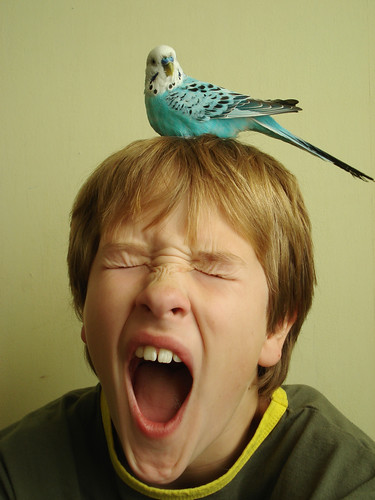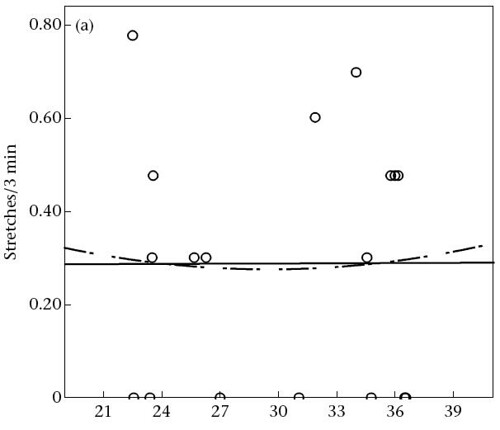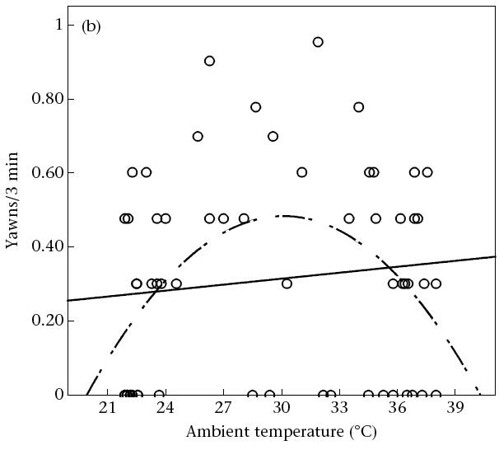tags: yawning, thermoregulation, budgerigars, Melopsittacus undulatus, animal behavior
Yawning human, Homo sapiens serving as a perch for a domestic budgerigar, Melopsittacus undulatus.
Image: Wendy (Creative Commons License).
Yawning. Everybody does it. In fact, I am yawning now as I write this piece. Yawning is interpreted to have a variety of meanings, ranging from tiredness to boredom. Perhaps more interesting is the fact that yawning is contagious among humans, at least: watching someone else yawn, seeing a photograph or reading about -- and even the mere thought of -- yawning is enough to induce this behavior in observers. (Tell me: have you yawned yet?) Even though yawning is very common, the physiological and evolutionary reasons for yawning behavior are poorly understood.
Yawning is a familiar behavior characterized by a large gaping of the mouth, accompanied by a deep inhalation of air, followed a shorter expiration. This behavior is under involuntary control, so it cannot be consciously controlled or suppressed. Further, yawning is a stereotyped behavior expressed by all classes of animals, and is correlated by a variety of neurochemical changes in the brain. Previous research suggests that yawning is a biological mechanism in humans and non-human apes, such as chimpanzees, to keep the brain from overheating.
"Brains are like computers," reports Andrew Gallup, a researcher in the Department of Biology at Binghamton University who led the study. "They operate most efficiently when cool, and physical adaptations have evolved to allow maximum cooling of the brain."
This is known as the "radiator hypothesis" or the "brain-cooling hypothesis," which can be tested.
"Based on the brain-cooling hypothesis, we suggest that there should be a thermal window in which yawning should occur," Gallup proposed. "For instance, yawning should not occur when ambient temperatures exceed body temperature, as taking a deep inhalation of warm air would be counterproductive. In addition, yawning when it is extremely cold may be maladaptive, as this may send unusually cold air to the brain, which may produce a thermal shock."
To test this hypothesis, Gallup and his colleagues, Michael Miller and Anne Clark, studied yawning in wild budgerigars, Melopsittacus undulatus. They chose budgerigars because they have relatively large brains for their body size, they live wild in arid regions of Australia that are subject to frequent and dramatic temperature changes, and -- most important for their experimental design, where they tested the birds in small groups -- budgerigars do not experience contagious or sympathetic yawning, as humans and some other animals do.
To do this work, the researchers divided the small parrots into groups of four, placed them into a wire cage and filmed them while they were subjected to changes in the ambient temperature from 22 to 38 degrees Celsius. Later, these films were scored by observers on the basis of cooling behaviors (yawning and gular fluttering -- the rapid and continuous opening and closing of the beak, which acts to flap membranes in the throat and thereby increase evaporative cooling). These observers were unaware of the ambient temperature that the experimental birds were subjected to.
Their data revealed that the budgerigars were more than twice as likely to express cooling behaviors such as yawning as the ambient temperature rose. Yawning behavior peaked at 30 degrees Celsius, then decreased, to be supplanted by gular fluttering (figure 1). Apparently, yawning is the initial thermal regulatory response but as the ambient temperature further increases and heat dissipation becomes more difficult, gular flutterring is triggered.
Figure 1. Frequency and distribution of (a) stretching and (b) yawning in budgerigars in response to ambient temperature. o: observed; _: linear regression; ._.: quadratic regression.
These data indicate that yawning is, indeed, a biological thermoregulatory behavior, triggered by increased ambient temperatures.
But why do we care about yawning? There is a growing body of medical and physiological research that links increased ambient temperatures with the unpleasant symptoms of certain medical conditions. Further, it has also been noted that yawning often precedes an epileptic seizure or a migraine headache among those who suffer from them, and increased yawning is also associated with multiple sclerosis. Furthermore, individuals with these health problems tend yawn excessively anyway. Additionally, people who are taking paxil (paroxetine HCl) or Celexa (citalopram) often experience excessive yawning during the first three or so months of treatment. Thus, excessive yawning in humans may be indicative of health problems or can be associated with medications that should be investigated further.
But there are positive aspects to yawning too, because it serves to reinstate an optimal brain temperature that facilitates mental alertness and arousal, and its infectiousness may have evolved to facilitate group vigilance.
"Yawning more accurately reflects a mechanism that maintains attention, and therefore should be looked at as a compliment!" concluded Gallup.
So tell me: have you yawned yet?
Sources:
A Gallup, M Miller, A Clark (2009). Yawning and thermoregulation in budgerigars, Melopsittacus undulatus. Animal Behaviour, 77 (1), 109-113 DOI: 10.1016/j.anbehav.2008.09.014.
Andrew C. Gallup, Gordon G. Gallup Jr. (2007). Yawning as a Brain Cooling Mechanism: Nasal Breathing and Forehead Cooling Diminish the Incidence of Contagious Yawning. Evolutionary Psychology, 5 (1), 92-101 [free PDF].




must...resist...urge...
"and its infectiousness may have evolved to facilitate group vigilance."
A lot of human interaction is unconscious, like the way people synchronise body posture, gestures, volume and pacing of speech, breathing rate and general mood.
So I might rewrite the line:
The infectiousness of laughter and yawning may have evolved to promote group synchrony and coherence.
At first, I had no response. By the end of your post I had started yawning at every mention of the word.
This is thoroughly unscientific, but when I was much younger my grandfather would tell me that dreams were in the air all around us, and when we yawned they got inside us so we could see them when we were asleep.
Well, obviously we all did yawn, because we were all reading the post so intensively that our brains were over-heating. This is an improvement, normally most of your readers are snoring by the end of the post.
*runs and hides*
I call BS. From beginning to end this is implausible, and what is the fit on that data? There is no trend there, it's just noise.
For one, comparing animals for whom respiration is a significant mechanism of cooling to humans doesn't make sense. We can sweat, redirect blood to the surface area of our skin etc., to thermoregulate and these are our dominant mechanisms for doing so. Humans don't pant like dogs to dissipate heat for instance. Why would we yawn?
"Cooling the brain" makes little sense in this context as our bodies have far more elaborate and effective mechanisms to do this. And there is a better and more plausible mechanism for yawning. That is physiologic splinting open of alveoli. As we breathe at rest our tidal volumes are quite low and the total minute ventilation of the alveoli is modest at rest. Especially as we slow down and are less active this ventilation gets quite low (like at bedtime when we're sleepy). As a result, alveoli collapse causing atelectasis. To maintain airflow and splint alveoli back open we yawn, vastly increasing ventilation and opening pressure on the alveoli. This serves two purposes - keeping the lungs well ventilated and preserving the mucus transport function of the lungs that fails with collapse predisposing to infection.
You see this in the hospital, people who are bedridden develop atelectasis which can predispose them to pnuemonia and infections since the closed alveoli don't expel mucus and get all clogged up. We give them incentive spirometers to make sure they keep taking deep breaths and keep splinting those alveoli open and decrease the rates of atelectasis and pnuemonia.
As far as the second piece, where people yawn less when they breathe through their nose? Duh! There is a big difference in ventilation through two small wholes and big gaping mouth, both having to do with inspiratory pressure. You have to generate lower pressures to breathe in through your nose requiring greater inspiratory effort. As far as the packs, I don't know why they yawned less. But when you hold a cold pack to your forehead you're cooling your forehead, not your brain. Your body's ability to maintain a nice constant internal temperature isn't going to be beaten by a cold pack.
I agree with Mark. Those graphs dont look that impressive. On the other hand, the alveolar collapse theory does not explain everything either. why do we yawn more when we are sleep deprived? or is that just me?
I with Omar Ali. I yawn when I am tired. Seeing other people yawn or seeing pictures reading about it does not make me yawn. Lack of sleep or after a meal was drowsy does. Like MarkH, I call BS.
Further "research" here though results are, oh well, inconclusive. Ben
Just a comment on the graph from a practicing statistician - the data are counts, so that's about as good as you're going to get with these numbers. From the plot, I'm pretty happy that the quadratic curve is there (although I would have used a different analysis, and I'd like to look at the residuals to be sure).
Interesting study. Thanks for your contribution to Take Charge of Your Health Care carnival.
The 'Air Intake' theory is bunk, cause babies yawn in the womb, where there is obviously no air.
The 'CPU overheating' theory makes more sense, but really we still dont actually know.
was very very helpful for a project i'm doing. thanks
I have a comment specifically about how the author/researcher suggest that yawning and seizures/migraines are so connected. I am a migraine sufferer and have been for the last 14 years. Yawning before a migraine attack is very common for me. But what is strange is that my entire life, EVERY time I yawn, my whole body shakes involuntarily right after. So I wonder if my body shaking is a slight seizure. Ever since I have been on Topamax (an anti-seizure drug), my migraines have improved from the migraines that are triggered by bright, flickering or certain types of lights. I haven't noticed, however, if the shaking around the time I yawn has improved since being on the Topamax.
Just wanted to know if anyone else had ever had that experience when they yawn.